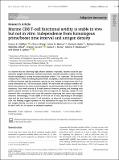Murine CD8 T‐cell functional avidity is stable in vivo but not in vitro: Independence from homologous prime/boost time interval and antigen density
Author(s)
Gilfillan, Connie B.; Wang, Chensu; Mohsen, Mona O.; Rufer, Nathalie; Hebeisen, Michael; Allard, Mathilde; Verdeil, Grégory; Bachmann, Martin F.; Speiser, Daniel E.; Irvine, Darrell J. (Darrell John), 1973-; ... Show more Show less
DownloadPublished version (601.9Kb)
Publisher with Creative Commons License
Publisher with Creative Commons License
Creative Commons Attribution
Terms of use
Metadata
Show full item recordAbstract
It is known that for achieving high affinity antibody responses, vaccines must be optimized for antigen dose/density, and the prime/boost interval should be at least 4 weeks. Similar knowledge is lacking for generating high avidity T-cell responses. The functional avidity (FA) of T cells, describing responsiveness to peptide, is associated with the quality of effector function and the protective capacity in vivo. Despite its importance, the FA is rarely determined in T-cell vaccination studies. We addressed the question whether different time intervals for short-term homologous vaccinations impact the FA of CD8 T-cell responses. Four-week instead of 2-week intervals between priming and boosting with potent subunit vaccines in C57BL/6 mice did not improve FA. Equally, similar FA was observed after vaccination with virus-like particles displaying low versus high antigen densities. Interestingly, FA was stable in vivo but not in vitro, depending on the antigen dose and the time interval since T-cell activation, as observed in murine monoclonal T cells. Our findings suggest dynamic in vivo modulation for equal FA. We conclude that low antigen density vaccines or a minimal 4-week prime/boost interval are not crucial for the T-cell's FA, in contrast to antibody responses.
Date issued
2019-11Department
Koch Institute for Integrative Cancer Research at MITJournal
European Journal of Immunology
Publisher
Wiley
Citation
Gilfillan, Connie B. et al. "Murine CD8 T‐cell functional avidity is stable in vivo but not in vitro: Independence from homologous prime/boost time interval and antigen density." European Journal of Immunology 50, 4 (April 2020): 505-514 © 2019 The Authors
Version: Final published version
ISSN
0014-2980
1521-4141